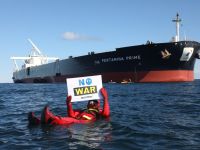Since were first were introduced in the wake of the 1991 Gulf War, Iraq has always sought to rid itself of the burden of UN-imposed economic sanction, which today prevent the export of crude oil, unless the proceeds are used for humanitarian purposes.
Initially, Baghdad’s strategy was to stress the suffering that sanctions were causing ordinary Iraqis, and particularly children.
Indeed it was public pressure resulting from this campaign that in many ways was responsible for what could be described as the initial erosion of the sanctions package—the “oil for food” program
But, of late, the Iraqis have perceptively altered their strategy. In part this may be the result of an understanding that the “oil for food” program undermined their original contention that the sanctions primarily impacted on the weaker elements of the Iraqi population.
However, it more likely that the Iraq’s new plans is born out of understanding that the world community in no longer enraptured by punishing the Saddam Hussein government, and instead is more inclined to see Iraq as a lost business opportunity.
Within this context, the Iraqis appear to have embarked on a program aimed, on the one hand at eroding the sanctions regime, and at the same time encouraging neighboring governments and representatives of the world business community to pressure members the UN Security Council into supporting an abolition of the economic sanctions against Iraq.
Iraq today is able to export oil via two specific channels–Mina Al-Baker a seaport with access to Persian Gulf waterway, and through pipelines to the Turkish port of Ceyhan. These routes are carefully monitored by the UN and ostensibly are sanctions-busting proof.
What the Iraqis appear to be doing is encouraging cooperation with neighboring states in downstream oil industry activities, and cooperation in upstream activities with companies from other countries.
It generally is careful not to come into direct conflict with the UN, but it certainly appears to be prepared to test the UN’s limits of power.
DOWNSTREAM ACTIVITIES
Syria:
A most interesting and dramatic development of recent months has Iraq’s rapprochement with Syria. The country’s, which are led by two rival camps of the Baath Party, agreed as far back as 1998 they on opening of an existing oil pipeline, which had been shut down in 1982.
Final action, though, was delayed as a result of U.S.-led UN intervention. Nonetheless, the pipeline project appears to have been put on the frontburner once again, and some reports estimate that it be activated in as little time as several week.
Baghdad intends exporting to Syria 100,000 barrels per day, at a reduced price, eventually increasing the amount to 200,000 barrels per day.
Jordan:
Jordan was and still is the foremost allay of Iraq in the Arab World. The two countries currently are considering building a 750 km pipeline from the Iraq’s Haditha station to Zarqa refinery in Jordan.
The estimated cost of the pipeline is $325 million, of which Jordan intends providing $150 million worth of financing. The Jordanians intend inviting bids from foreign companies for the project.
Lebanon:
On October Lebanon’s oil minister declared that his country would like to receive oil from Iraq, along similar to those received by Jordan. Also Lebanon and Syria recently agreed to repair an old Iraqi pipeline, the final destination of which is a refinery at Tripoli. The cost of the latter project is $2-3 million and it will be financed by both Syria and Lebanon.
Turkey:
Iraq has approached several French, Italian, and Turkish companies about building a 1,380-km gas pipeline to Turkey. An agreement turned to several companies –to give suggestions for a gas pipeline of some.
The actual agreement about the pipeline was signed between Turkey and Iraq in 1996, but progress on the project has been minimal because of UN opposition.
UPSTREAM ACTIVITIES
Iraq is actively seeking investors willing to help it develop its oil fields, and has approached companies from China, France and Russia.
There are also reliable reports that several U.S companies have shown interest in this sector. The UN monitors have been active in preventing any projects from going ahead, but not in stopping the international business community from whetting its appetite.
The most active companies in the upstream sector appear to be Russian. Slaveneft, a Russian-Byelorussian corporation was supposed to sign a development agreement on the Shubba oil field, but it wants UN approval before advancing the project.
Zarabezhneft completed the drilling of a well at the Kirkuk field in December 1999, and has a contract for drilling another 100 wells in North Rumaila field. LukOilwas active in West Qurna field from 1997. It stopped working after being threatened by the UN threats, but reportedly remains in close contact with the Iraqi authorities.
Western companies are also involved. ElfTotalFina is reportedly on the verge of signing an agreement with Iraq for the development of Majnoon and Nahr Umar fields.
With the latter producing as much as 440,000 barrels per day. Agip and RepSolare interested in smaller fields such as Nasiriya. Videsh Ltd (OVL), an Indian company, signed agreement with Iraq for exploration and prospecting of Block 8 in the Iraqi Western desert. It lies close-by the existing Abu-Khema field.
It is still difficult to say with certainty that all of Iraq’s activities are part of a well-established plan. It is possible that they simply are trying to exploit all available opportunities, but there is likely method in what they are doing.
Essentially, it looks as if the Iraqis are trying to build a network of partnerships, where none is critical to the entire industry in and of itself, but together they constitute a force that is relatively resilient when it comes to UN sanctions.
And at the same time it is improving its own independent manufacturing capacity, both upstream and downstream. This involves projects such as building at least 10 mobile refinery units, each with 10,000 barrels per day capacity. According to Iraqi sources, one or two of these facilities are already operational.
And even the Iraqi military industries are in on the deal, developing of seismic bombs and equipment to deal with the “humid well” phenomenon.
— (Albawaba-MEBG)







